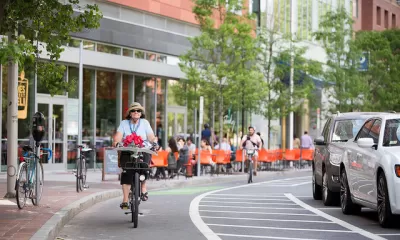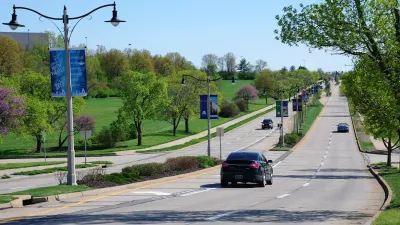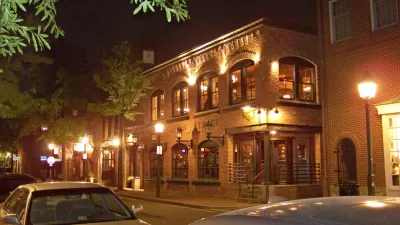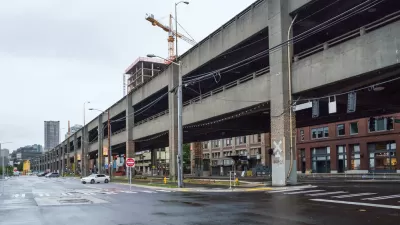I don't bike, but I still feel safer on streets with bike lanes. This essay explains why.

I never learned to ride a bicycle. And yet I am an active member of an organization dominated by bicycle riders, and is often focused on increasing the number of urban bike lanes. Why?
Because I believe that walkers benefit from bike lanes as well. Here's why: when a traffic lane is devoted to bicycles and taken away from cars, this means that the remaining lanes are either narrower or there are fewer of them. As a matter of common sense, it seems obvious that motorists drive more slowly on narrower streets. And when motorists drive more slowly, they are less dangerous to walkers or to each other. For example, if you are a walker hit by a car going 20 miles per hour, you have a 5 percent chance of death. By contrast, if you are hit by a car going 40 miles per hour, you have an 85 percent chance of death. Thus, a street design that calms traffic is likely to reduce the amount of injuries and deaths caused by vehicle traffic. It follows that bicycle lanes reduce danger to pedestrians by calming traffic.*
Walkers benefit even more when a bike lane is separated from auto traffic by a small refuge island or similar structure. In such cases, a pedestrian can cross to the island and then cross again from the refuge island to the sidewalk across the street. Where this is the case, a walker need not cross as many lanes of traffic at a time; instead, she can make the short crossing to the island, than a second longer crossing to the sidewalk. It seems to me that this two-step crossing is a bit safer for the walker. When I cross at a traffic light, I always have to worry that the light might change while I am in the street, increasing my risk of a head-on collision with a car. But the fewer seconds I spend crossing the street at an intersection, the lower this risk is. So if a two-step process reduces the number of seconds I spend crossing at a time, it may reduce my risk of being victimized by changing traffic lights.
Unfortunately, not all pedestrians in my city agree with me. A few weeks ago, I met someone who does not drive, but who complained about how much she hated bicycle lanes; she somehow felt that bikes were more dangerous than cars. This fear is somewhat understandable, because my acquaintance had become used to cars, and was not yet used to bicycles. However, her fear is not rationally based. In 2016, 148 New York City pedestrians (and 18 cyclists) were killed by motor vehicles. By contrast, not one pedestrian was killed by a cyclist. It follows that if (as I suspect) bike lanes in fact make pedestrians safer, this benefit outweighs any risk to pedestrians caused by additional cycling.
*I note that motorists often oppose bicycle lanes for this very reason, asserting that they increase congestion. But speed and congestion are not the same thing; when I am driving, I suffer far more when I am trapped in a traffic jam at a high-speed arterial or interstate highway than I do when I am driving at a slow, even 20 mph pace for streets designed for 20 mph traffic.

Planetizen Federal Action Tracker
A weekly monitor of how Trump’s orders and actions are impacting planners and planning in America.

USGS Water Science Centers Targeted for Closure
If their work is suspended, states could lose a valuable resource for monitoring, understanding, and managing water resources.

End Human Sacrifices to the Demanding Gods of Automobile Dependency and Sprawl
The U.S. has much higher traffic fatality rates than peer countries due to automobile dependency and sprawl. Better planning can reduce these human sacrifices.

Trump: Federal Government Won’t Pay for California HSR
The President has targeted federal funding for the California bullet train project since his first administration.

San Francisco Enhances Urban Planning Initiatives with Green Infrastructure
San Francisco incorporates green infrastructure in its city development initiatives, elevating the importance of sustainability in urban planning.

Chicago Approves Green Affordable Housing Plan
The Mayor’s plan calls for creating a nonprofit housing corporation tasked with building affordable housing that meets Green Building standards.
Urban Design for Planners 1: Software Tools
This six-course series explores essential urban design concepts using open source software and equips planners with the tools they need to participate fully in the urban design process.
Planning for Universal Design
Learn the tools for implementing Universal Design in planning regulations.
Tyler Technologies
New York City School Construction Authority
Village of Glen Ellyn
Transportation Research & Education Center (TREC) at Portland State University
Chaddick Institute at DePaul University
Institute for Housing and Urban Development Studies (IHS)
Regional Transportation Commission of Southern Nevada
Toledo-Lucas County Plan Commissions






























